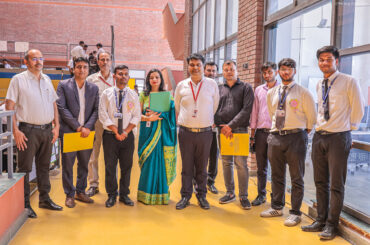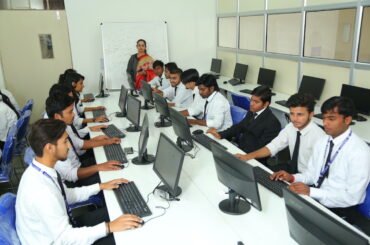Is BCA a Professional Course
Yes, the Bachelor of Computer Applications (BCA) is generally considered a professional course. It is structured to equip students with both foundational and advanced knowledge in computer applications. Is BCA a professional course? Indeed, it is specifically designed to prepare students for diverse careers in the IT industry, making them well-versed in the technological skills demanded by the field.
The curriculum typically covers a range of topics including programming languages, database management, networking, web development, software engineering, and data structures.
Here are some key points that highlight its professional nature:
Industry-Relevant Curriculum
The course content is often aligned with current industry standards and requirements, ensuring that graduates have the skills needed to meet the demands of the job market.
Practical Exposure
Many BCA programs include practical lab sessions, projects, and internships, giving students hands-on experience in solving real-world problems.
Career Opportunities
Graduates of BCA programs are equipped to pursue various roles in the IT sector such as software developer, systems analyst, network administrator, database manager, and IT consultant.
Higher Studies and Certifications
After completing a BCA, students can opt for higher studies like Master of Computer Applications (MCA) or pursue specialized certifications that further enhance their professional qualifications.
Soft Skills and Professional Development
BCA programs often include components that focus on soft skills such as communication, teamwork, and project management, which are crucial for professional success.
Some of the most opted courses in India and St. Andrews college or different Engineering college or Management colleges are as follows:-
- Btech
- Btech CSE
- Btech ETCE
- MTech
- BCA
- BBA
- MBA
- MCA
- DPharma – St. Andrews College of Pharmacy
- BPharma – St. Andrews College of Pharmacy
- BArch – St. Andrews College of Architecture
Overview of Bachelor of Computer Application (BCA) Degree
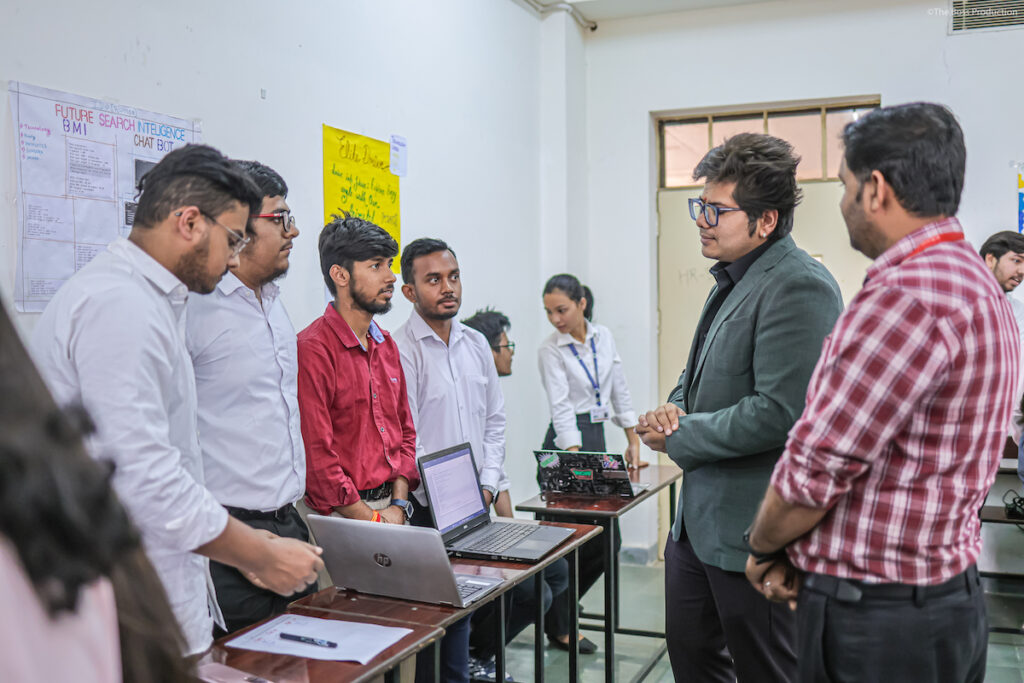
A Bachelor of Computer Application (BCA) degree is a three-year undergraduate program designed to impart knowledge in computer applications and software engineering.
The curriculum includes subjects such as programming languages, database management, software engineering, and computer networks. Is BCA a professional course? Yes, it is. The BCA program aims to equip students with the technical expertise required to design, develop, and troubleshoot software applications, providing a comprehensive education that prepares graduates for technical challenges in the industry.
The program also includes practical training through projects and internships, enhancing the real-world application of theoretical knowledge. Is BCA a professional course? Yes, it is designed to prepare graduates for careers as software developers, system analysts, web designers, and database administrators across various industries. Additionally, graduates may opt for further studies in fields like computer science or information technology to expand their expertise and career opportunities.
Objectives of BCA Program
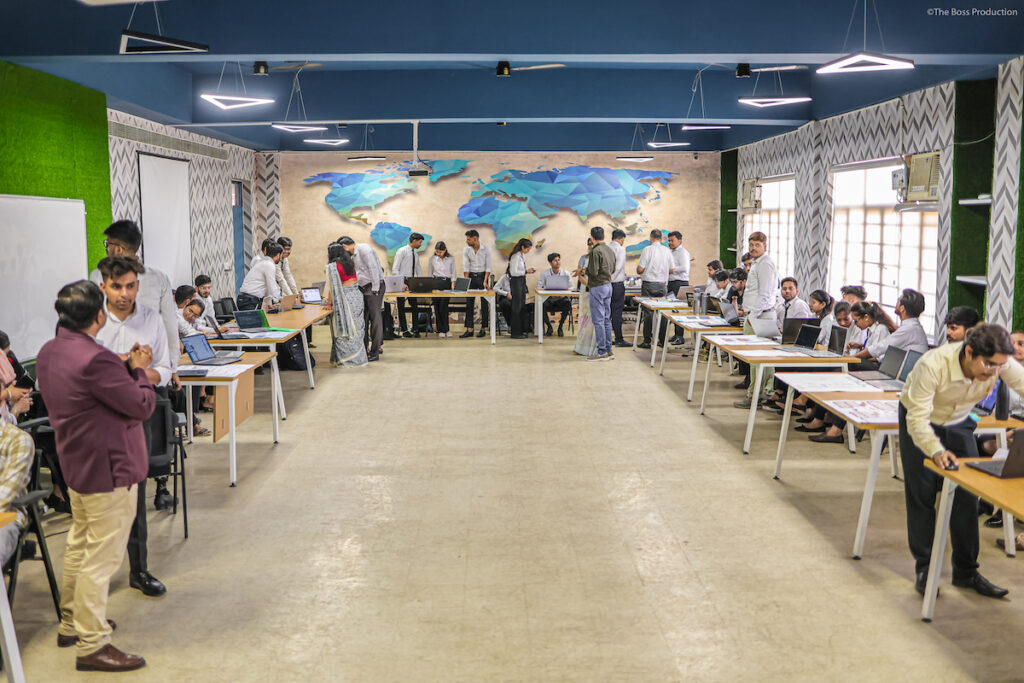
Here are the primary objectives of a BCA course:
Foundation in Computer Science
Provide students with a solid foundation in the principles of computer science, including programming languages, data structures, algorithms, and software engineering methodologies.
Application-Oriented Learning
Focus on practical applications of computer technology in various domains such as software engineering, database management, web technology, and networking.
Skill Development
Develop technical expertise in designing, coding, testing, and debugging software applications using modern programming languages and tools.
Problem-Solving Abilities
Enhance problem-solving skills through algorithmic thinking and logical reasoning, enabling students to address complex computational problems effectively.
Understanding of Computer Systems
Gain knowledge of computer hardware, operating systems, and system software, enabling students to understand the interaction between hardware and software components.
Industry-Relevant Training
Provide industry-relevant training through internships, projects, and collaborations with IT companies to bridge the gap between academic learning and real-world applications.
Communication and Interpersonal Skills
Develop effective communication skills, teamwork abilities, and professional ethics necessary for successful collaboration in multidisciplinary teams and interactions with clients.
Emerging Technologies
Introduce students to emerging technologies such as artificial intelligence, machine learning, cloud computing, and cybersecurity, preparing them for future technological advancements.
Entrepreneurship and Innovation
Foster an entrepreneurial mindset and innovation through projects and practical exercises, encouraging students to develop and implement creative solutions to real-world problems.
Career Readiness
Prepare students for entry-level positions in the IT industry or further studies in specialized areas such as computer science, information systems, or management information systems.
Continuous Learning
Instill a culture of continuous learning and professional development to adapt to evolving technologies and industry trends throughout their careers.
Ethical and Social Responsibility
Promote ethical behavior, social responsibility, and awareness of legal issues related to information technology, ensuring students adhere to ethical standards in their professional practice.
BCA Without Maths
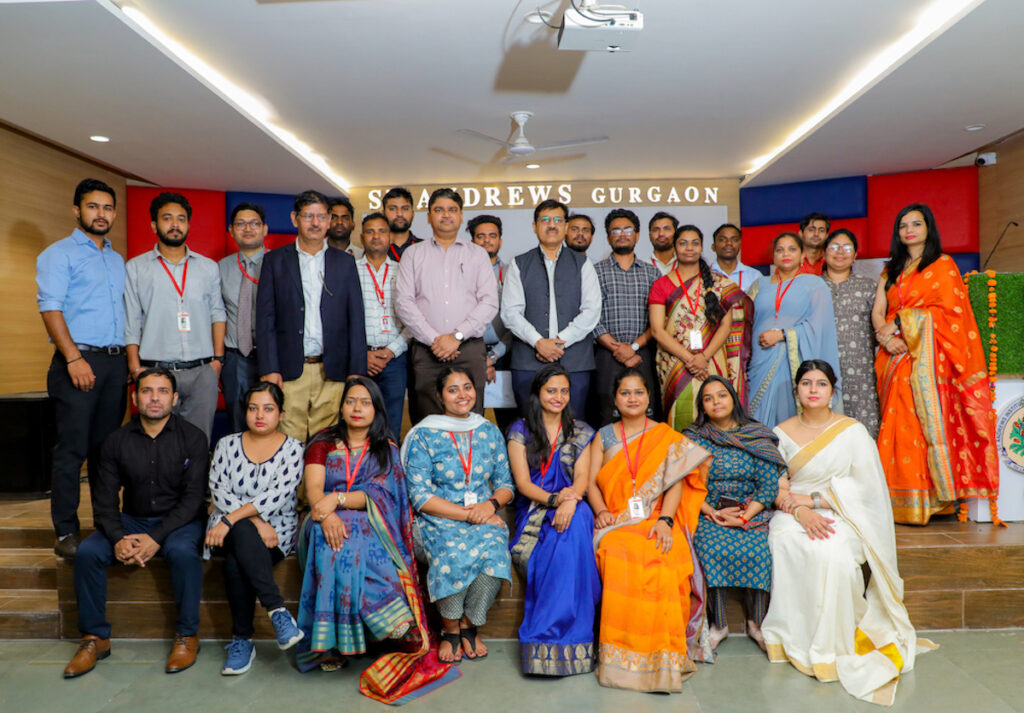
A Bachelor of Computer Application (BCA) program without mathematics caters to students interested in computer science and software engineering but without a strong background in mathematics.
This three-year undergraduate degree emphasizes the practical aspects of computing, covering coding languages, software engineering, database management, and computer networks. Is BCA a professional course? Absolutely, as it focuses on hands-on training through projects and internships, effectively preparing students for careers as software developers, system analysts, web designers, and more, by equipping them with relevant skills and real-world experience.
The curriculum is tailored to develop technical skills and problem-solving abilities relevant to the IT industry, offering opportunities for further studies in computer science or related fields upon graduation.
Fees Structure for BCA Course
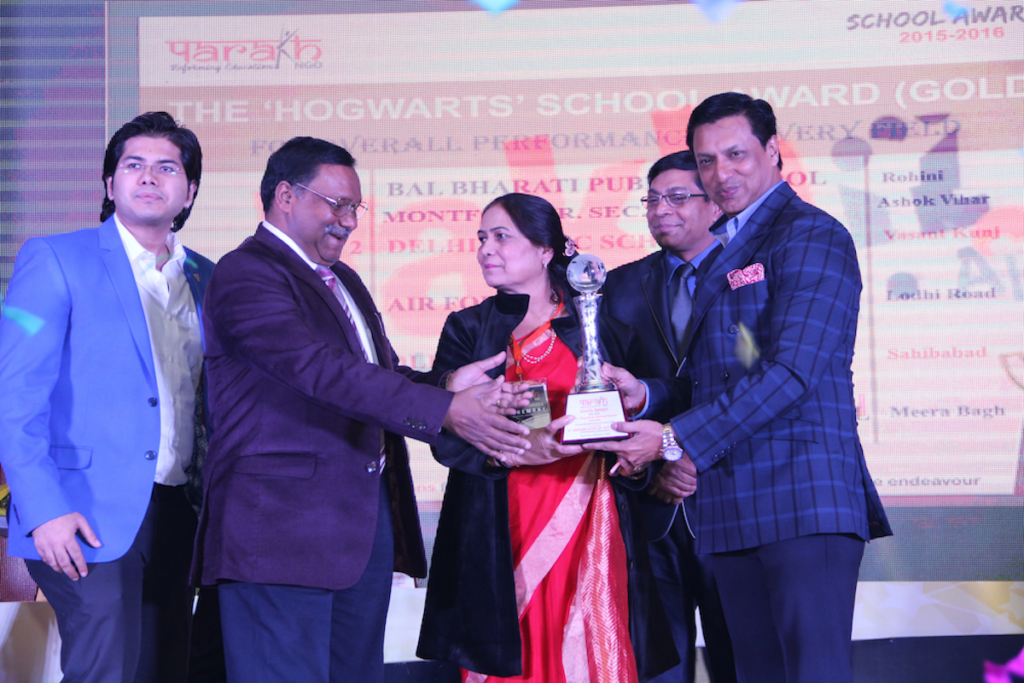
Here is a general overview of the possible fee ranges:
Government/Public Institutions
- Annual Fees: ₹20,000 to ₹60,000
- Total Fees (3 years): ₹60,000 to ₹1,80,000
Private Institutions
- Annual Fees: ₹50,000 to ₹2,50,000
- Total Fees (3 years): ₹1,50,000 to ₹7,50,000
Factors Influencing Fees
- Reputation and Ranking of the Institution: Higher-ranked institutions may charge higher fees.
- Location: Fees can be higher in metropolitan cities compared to smaller towns.
- Facilities and Infrastructure: Institutions with better facilities and infrastructure may have higher fees.
- Additional Costs: Some institutions may have additional costs for lab facilities, study materials, and other resources.
Examples
- State Universities (e.g., Delhi University, Bangalore University): ₹20,000 to ₹60,000 per year.
- Deemed Universities and Autonomous Colleges: ₹50,000 to ₹1,50,000 per year.
Additional Costs
- Hostel Fees: ₹20,000 to ₹1,00,000 per year, depending on the institution and type of accommodation.
- Exam Fees: May vary from ₹1,000 to ₹10,000 annually.
- Miscellaneous Expenses: Books, transportation, and other personal expenses.
Eligibility Criteria for BCA Admission
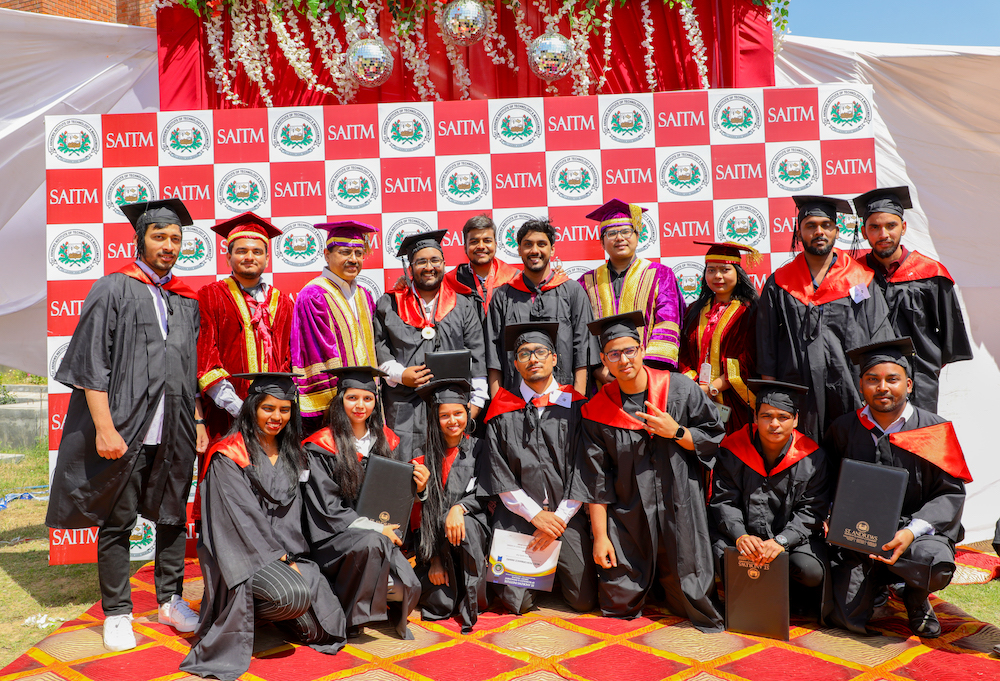
The eligibility criteria for BCA admissions generally include the following requirements, although they may vary slightly from one institution to another:
General Eligibility Criteria
- Educational Qualification
- Completion of higher secondary education (10+2) or equivalent from a recognized board.
- Some institutions may require specific subjects in 10+2, typically Mathematics or Computer Science.
- Minimum Marks
- A minimum aggregate score in the 10+2 examination, usually ranging from 45% to 60%, depending on the institution.
- Subject Requirements
- While many institutions accept students from any stream (Science, Commerce, Arts), some may require Mathematics or Computing Science as a subject in 10+2.
- Age Limit
- Some institutions may have an age limit, typically around 17 to 25 years at the time of admission.
Additional Criteria
- Entrance Exams
- Many institutes conduct BCA entrance exams to assess aptitude in areas such as Mathematics, English, Logical Reasoning, and Computer Knowledge for admission to their programs.
- Common entrance exams include IPU CET and others specific to certain institutions.
- Merit-Based Admission
- In some cases, admission may be based on the merit of the 10+2 examination marks.
- Interview or Group Discussion
- Some institutions may conduct a personal interview or group discussion as part of the selection process.
Specific Example Criteria
- Delhi University
- Minimum 60% aggregate in 10+2 with Mathematics as a mandatory subject.
- St. Andrews Institute of Technology and Management (SAITM), Gurgaon
- Completion of 10+2 in any stream with at least 50% marks.
BCA Curriculum

Typical BCA Curriculum
First Year
- Introduction to Computers and Programming Concepts
- Basic Mathematics for Computing
- C Programming
- Web Technology Fundamentals
- Communication Skills
Second Year
- Object-Oriented Programming with C++
- Data Structures
- Database Management Systems
- Operating Systems
- Software Engineering
Third Year
- Java Programming
- Computer Networks
- Mobile Application Development (Elective)
- Artificial Intelligence (Elective)
- Project Work
Additional Activities
- Workshops and Seminars: Regular sessions on emerging technologies and trends.
- Hackathons and Coding Competitions: Opportunities to develop and showcase coding skills.
- Clubs and Societies: Participation in computer science and IT-related clubs.
Specializations in BCA

Specializations in Bachelor of Computer Application (BCA) programs often vary by university, but common specializations include:
Software Development:
Focuses on coding languages, software engineering, and application development.
Web Development:
Concentrates on web technologies, including front-end and back-end development.
Database Management:
Covers database design, administration, and SQL programming.
Networking:
Focuses on computer networks, protocols, security, and administration.
Cyber Security:
Deals with protecting computer systems and networks from cyber threats.
Artificial Intelligence (AI) and Machine Learning:
Introduces students to AI concepts, algorithms, and applications.
Cloud Computing:
Focuses on cloud infrastructure, services, and management.
Mobile Application Development:
Concentrates on developing applications for mobile devices.
Higher Studies After BCA
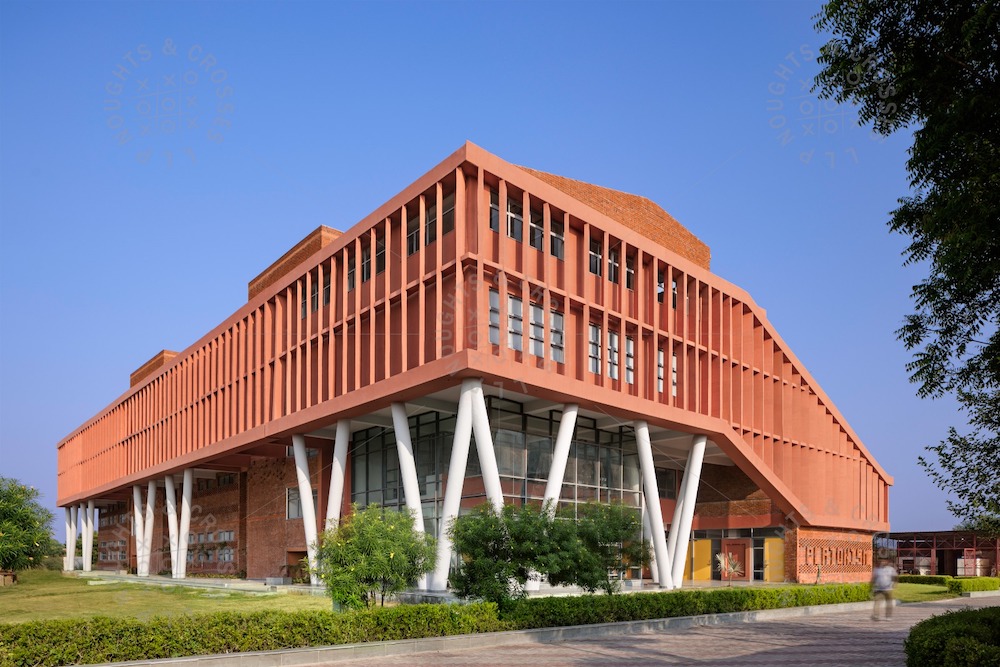
Here are some popular higher study options for Bachelor of Computer Application graduates:
Master of Computer Applications (MCA)
- Description: MCA is a popular choice for computing science graduates seeking advanced knowledge in computer applications and software engineering.
- Curriculum: Typically includes advanced topics in programming, software engineering, database management, web technologies, and elective specializations.
- Career Opportunities: Opens up senior roles in software engineering, systems analysis, project management, and IT consulting.
- Duration: Usually 2-3 years depending on the program and institution.
Master of Science (M.Sc.) in Computer Science or IT
- Description: Offers a broader theoretical and research-focused approach compared to MCA, suitable for those interested in academia or research-oriented careers.
- Curriculum: Covers advanced topics in algorithms, data structures, artificial intelligence, machine learning, and computational theory.
- Career Opportunities: Opportunities in research institutions, academia, data science, and specialized IT roles.
- Duration: Typically 2 years.
Master of Business Administration (MBA) in Information Technology
- Description: Combines business management skills with IT specialization, ideal for graduates interested in IT consulting, project management, or entrepreneurship.
- Curriculum: Covers business strategy, IT management, organizational behavior, and elective courses in technology management.
- Career Opportunities: Leadership roles in IT firms, consulting firms, tech startups, and corporate IT departments.
- Duration: Usually 2 years.
Post Graduate Diploma in Computer Applications (PGDCA)
- Description: Offers a focused study on practical aspects of computer applications, coding languages, and application development.
- Curriculum: Emphasizes hands-on learning and project work, similar to BCA but at a more advanced level.
- Career Opportunities: Entry-level positions in application development, database management, and IT support.
- Duration: Typically 1 year.
Specialized Certifications and Courses
- Description: Short-term certifications and courses in specialized areas such as cybersecurity, cloud computing, data analytics, and mobile application development.
- Curriculum: Provides focused training on specific technologies and skills relevant to current industry demands.
- Career Opportunities: Enhances job prospects and expertise in niche areas within the IT industry.
- Duration: Varies depending on the certification or course.
BCA vs. Other IT Courses Comparative Analysis

Duration
- BCA: 3 years
- B.Tech CS: 4 years
- B.Sc IT: 3 years
Curriculum Focus
- BCA: Emphasizes application development, coding languages, and software tools. Subjects include database management, web development, and software engineering.
- B.Tech CS: Covers both theoretical and practical aspects of computer science, including data structures, algorithms, computer networks, and hardware.
- B.Sc IT: Focuses on information technology applications, network administration, database management, and application development.
Mathematics Requirement
- BCA: Less math-intensive, with basic math skills required.
- B.Tech CS: Highly math-intensive, including calculus, discrete mathematics, and linear algebra.
- B.Sc IT: Moderate math requirements, with a focus on practical IT skills.
Practical vs. Theoretical Knowledge
- BCA: Balanced mix of practical and theoretical knowledge, focusing on real-world applications and application development.
- B.Tech CS: Strong emphasis on both theoretical foundations and practical implementations, with extensive lab work and projects.
- B.Sc IT: More practical-oriented, preparing students for IT infrastructure roles.
Career Prospects
- BCA: Roles in application development, web development, and IT support.
- B.Tech CS: Broader opportunities, including software engineering, system architecture, and research.
- B.Sc IT: Positions in network administration, IT support, and database management.
Benefits of Pursuing BCA Course
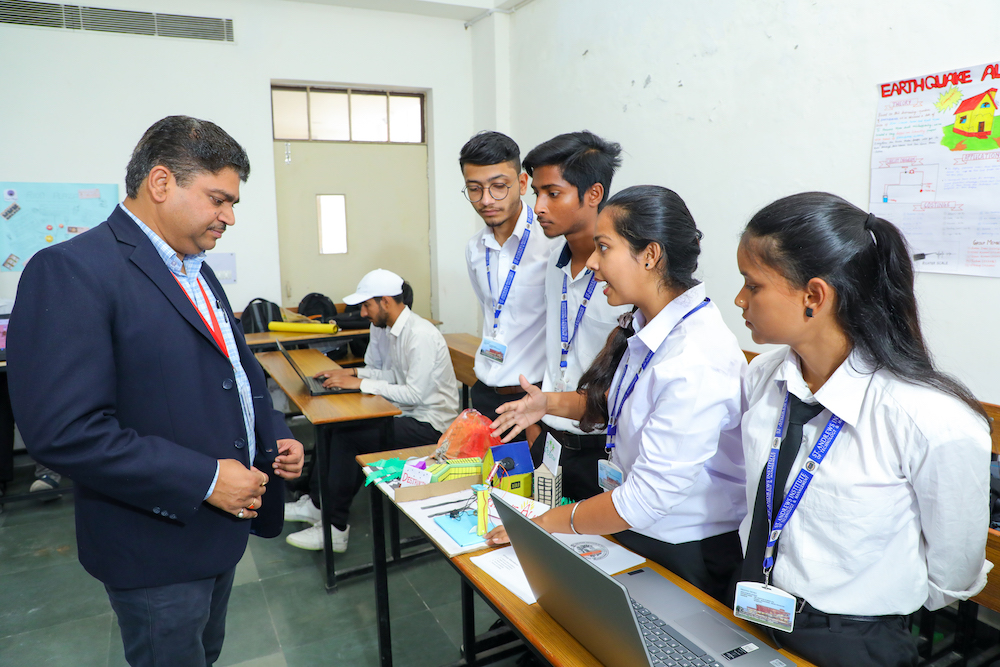
Here are some of the key advantages:
Strong Foundation in IT and Computer Science
- Comprehensive Curriculum: The BCA course covers a wide range of topics, including programming, database management, networking, web development, and software engineering, providing a solid foundation in computing science.
- Technical Skills: Students gain proficiency in various coding languages, software development tools, and technologies, which are highly valued in the IT industry.
Diverse Career Opportunities
- Job Roles: BCA graduates can pursue various roles such as software developer, systems analyst, network administrator, database manager, web developer, and IT consultant.
- Industry Demand: The demand for skilled IT professionals continues to grow, ensuring ample job opportunities for BCA graduates.
Higher Studies and Specializations
- Advanced Degrees: Bachelor Computer Application graduates can pursue higher education options like Master of Computer Applications (MCA), MBA in IT, or other specialized master’s programs.
- Certifications: Professional certifications in specific technologies (e.g., cybersecurity, cloud computing) can further enhance career prospects.
Practical Experience
- Hands-On Learning: The BCA curriculum includes lab sessions, projects, and internships, providing students with practical experience and real-world problem-solving skills.
- Industry Exposure: Internships and industry projects help students gain exposure to the professional environment and understand industry requirements.
Skill Development:
- Analytical and Problem-Solving Skills: The course emphasizes analytical thinking and problem-solving, crucial for tackling complex technical challenges.
- Soft Skills: Communication, teamwork, and project management skills are also developed, preparing students for collaborative work environments.
Competitive Salary Packages
- Lucrative Jobs: IT professionals often enjoy competitive salaries and benefits, with the potential for rapid career growth and financial stability.
- Career Progression: With experience and advanced skills, Bachelor of Computer Application graduates can quickly move up the career ladder to senior positions.
Entrepreneurship Opportunities
- Start Your Own Business: The knowledge and skills acquired in a BCA course can empower graduates to start their own tech-based businesses or work as freelancers.
- Innovation and Creativity: The course encourages innovation and creative thinking, essential for entrepreneurial success.
Flexibility and Global Opportunities
- Diverse Industries: IT skills are applicable across various industries, including finance, healthcare, education, and entertainment.
- Global Demand: The global demand for IT professionals means BCA graduates can explore job opportunities worldwide.
Adaptability to Technological Advancements
- Continuous Learning: The IT field is dynamic, and a BCA course instills a mindset of continuous learning and adaptation to new technologies and trends.
- Future-Proof Career: Skills acquired in a BCA course remain relevant as technology evolves, ensuring long-term career sustainability.
Choosing the Right BCA College
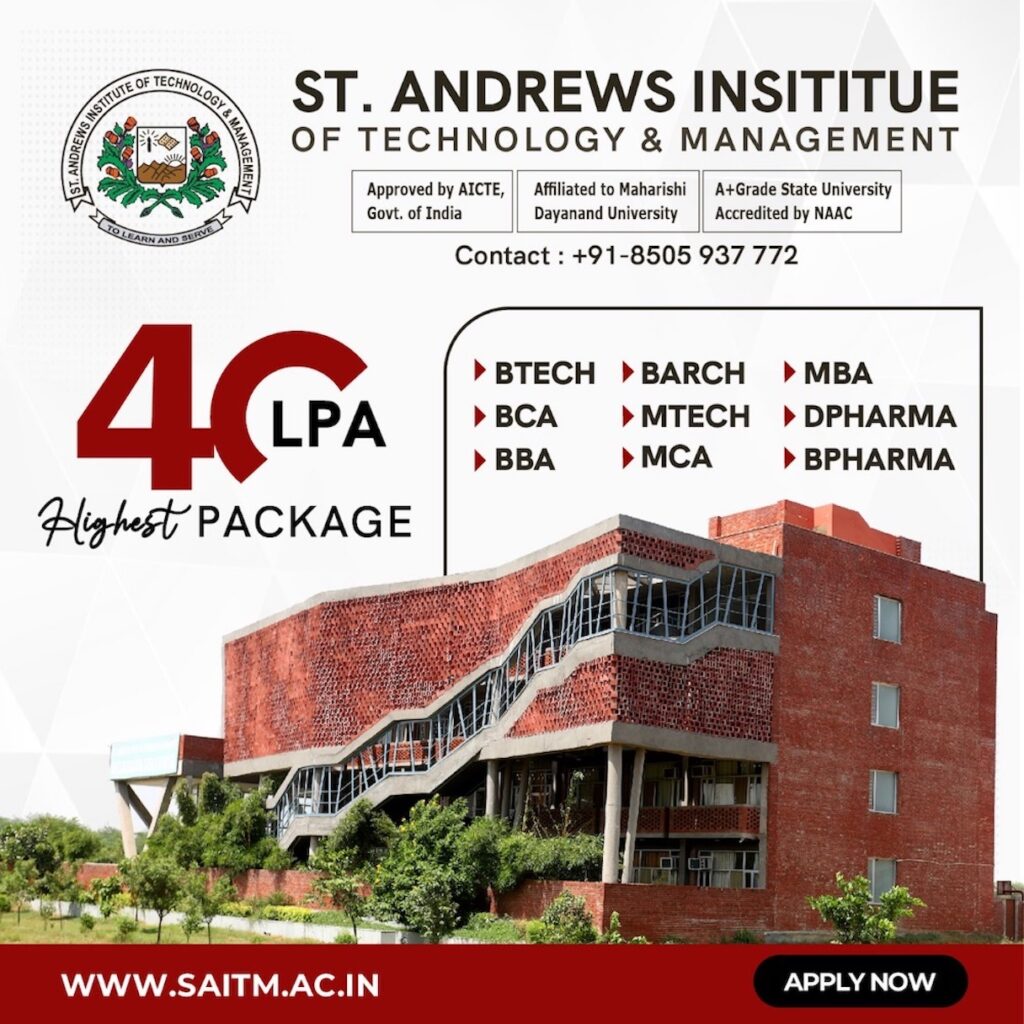
Choosing the right BCA college involves considering several factors:
Accreditation and Reputation
Look for colleges accredited by recognized bodies. Reputation in terms of faculty, infrastructure, and alumni can also guide your choice.
Curriculum and Specializations
Check if the college offers specializations aligned with your career goals, such as software development, web development, or cybersecurity.
Faculty
Experienced and knowledgeable faculty can significantly impact your learning experience. Research their qualifications and industry experience.
Infrastructure and Facilities
Ensure the college has adequate labs, libraries, and IT infrastructure to support your studies.
Placement Opportunities
Evaluate the college’s track record in placing students in reputable companies. Look for internship opportunities and industry tie-ups.
Location and Environment
Consider the location’s safety, accessibility, and suitability for your personal preferences.
Student Support Services
Check for academic support, career counseling, and extracurricular activities that enhance your overall development.
Cost and Affordability
Compare tuition fees, scholarships, and financial aid options available to ensure it fits your budget.
Top Colleges for BCA Course
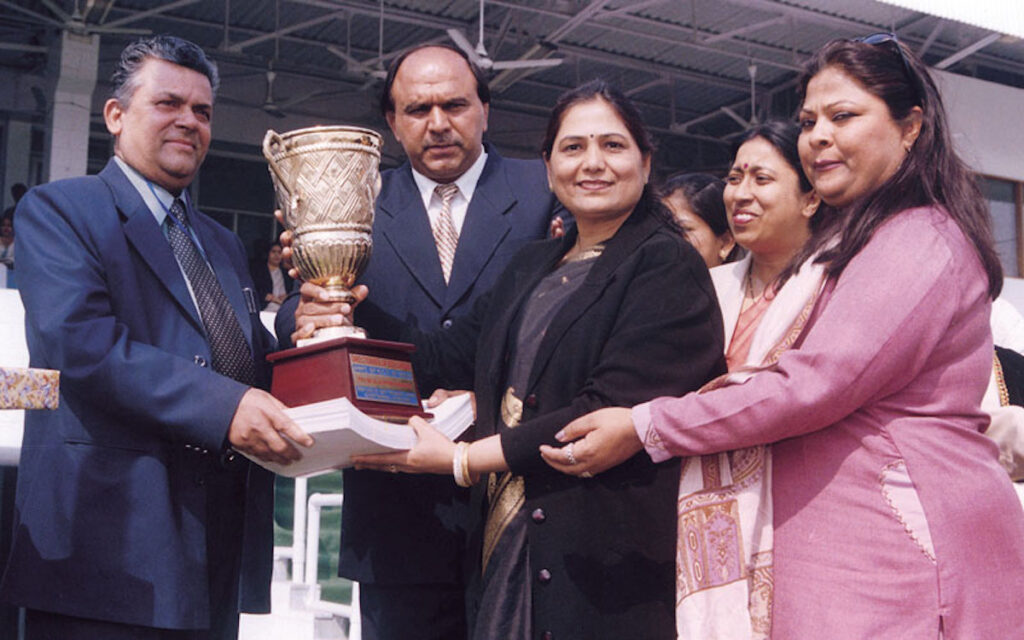
Here are some of the top BCA colleges in India renowned for their programs:
Christ University, Bangalore
- Location: Bangalore, Karnataka
- Highlights: Renowned for its quality education, modern infrastructure, and strong industry connections. Offers comprehensive BCA courses with emphasis on practical learning and placements.
St. Andrews Institute of Technology and Management (SAITM), Gurgaon
- Location: Gurgaon, Haryana
- Highlights: Known for its academic excellence and holistic approach to education. Offers a rigorous BCA course with a focus on computing science fundamentals and application development.
Presidency University, Bangalore
- Location: Bangalore, Karnataka
- Highlights: Offers a BCA course that combines theoretical knowledge with practical skills. Known for its faculty expertise, industry collaborations, and placement opportunities.
Department of Computing Science, Banaras Hindu University (BHU)
- Location: Varanasi, Uttar Pradesh
- Highlights: BHU is one of the oldest and prestigious universities in India. Its Department of Computing Science offers a robust BCA course with strong emphasis on research and applied learning.
Madras Christian College (MCC), Chennai
- Location: Chennai, Tamil Nadu
- Highlights: MCC is a reputed institution known for its academic excellence and holistic development approach. Offers a BCA programme with a blend of theoretical knowledge and practical skills.
Pune University (Savitribai Phule Pune University)
- Location: Pune, Maharashtra
- Highlights: Pune University offers a BCA program that focuses on software applications, coding languages, and software development. Known for its strong alumni network and placement opportunities.
Mount Carmel College, Bangalore
- Location: Bangalore, Karnataka
- Highlights: Known for its academic excellence and vibrant campus life. Offers a comprehensive BCA program with a focus on software applications, programming, and software development.
Career Scope for BCA Graduates
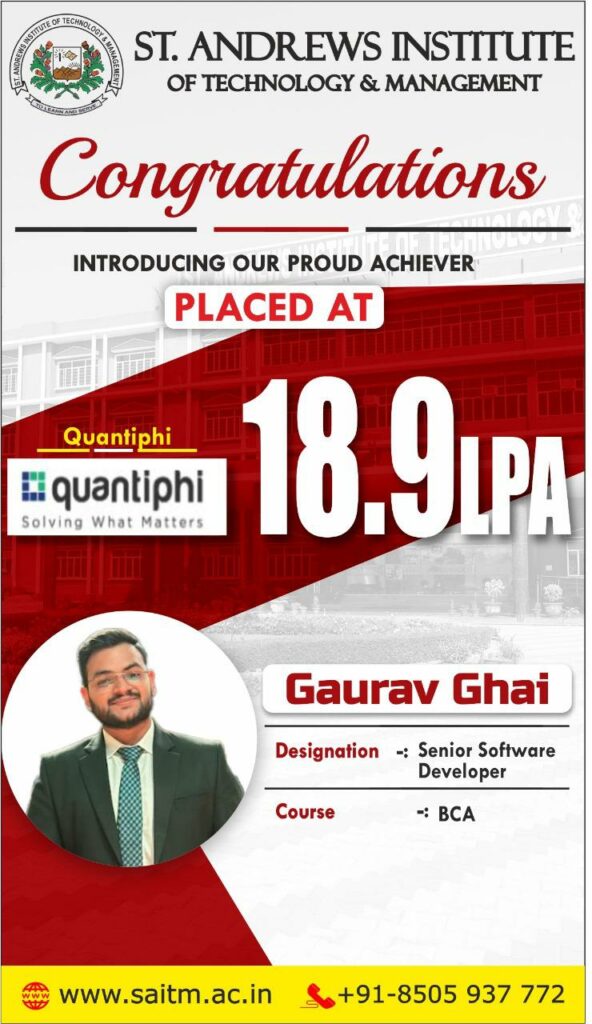
Here’s an overview of the career opportunities available to BCA graduates:
Software Developer/Engineer
- Role: Develops and maintains software applications, systems, and platforms.
- Skills Needed: Proficiency in coding languages (e.g., Java, Python, C++), software engineering methodologies, and problem-solving skills.
- Opportunities: IT companies, software firms, startups, and across various sectors like finance, healthcare, and e-commerce.
Web Developer
- Role: Designs and builds websites, web applications, and user interfaces.
- Skills Needed: Knowledge of web technologies (HTML, CSS, JavaScript), web frameworks (React, Angular), and UI/UX design principles.
- Opportunities: Web development agencies, digital marketing firms, e-commerce companies, and freelance opportunities.
Systems Analyst
- Role: Analyzes and designs IT systems to meet organizational needs.
- Skills Needed: Understanding of business processes, system architecture, and communication skills.
- Opportunities: IT consulting firms, large corporations, government agencies, and healthcare organizations.
Database Administrator (DBA)
- Role: Manages and maintains databases to ensure data security, integrity, and availability.
- Skills Needed: Proficiency in database management systems (SQL, Oracle), data modeling, and backup/recovery procedures.
- Opportunities: IT departments, financial institutions, telecommunications firms, and data-driven organizations.
IT Consultant
- Role: Provides advisory services on technology solutions, IT infrastructure, and digital transformation strategies.
- Skills Needed: Analytical thinking, problem-solving skills, and knowledge of industry trends.
- Opportunities: Consulting firms, advisory services, and as independent consultants.
Cybersecurity Analyst
- Role: Protects organizations’ computer systems and networks from cyber threats, conducts security assessments, and implements security measures.
- Skills Needed: Understanding of cybersecurity principles, ethical hacking techniques, and familiarity with security tools.
- Opportunities: Cybersecurity firms, financial institutions, government agencies, and multinational corporations.
Data Analyst/Scientist
- Role: Analyzes complex data sets to derive insights and support decision-making processes.
- Skills Needed: Proficiency in data analysis tools (R, Python), statistical analysis, data visualization, and machine learning.
- Opportunities: Data-driven companies, healthcare organizations, research firms, and finance sectors.
Entrepreneurship and Freelancing
- Role: A BCA graduate can embark on starting their own tech-based venture or operate independently as a freelance IT professional.
- Skills Needed: Business acumen, networking skills, and technical expertise.
- Opportunities: Startups, freelance platforms, consulting services, and digital marketing agencies.
Top Companies Hiring BCA Graduates

Here are some of the leading companies known for hiring BCA graduates:
Tata Consultancy Services (TCS)
- Roles: Software Developer, System Analyst, IT Support
- Industry: IT Services and Consulting
Infosys
- Roles: Software Engineer, Systems Engineer, Technical Support
- Industry: IT Services and Consulting
Wipro
- Roles: Project Engineer, IT Consultant, Software Tester
- Industry: IT Services and Consulting
HCL Technologies
- Roles: Software Developer, Network Engineer, Technical Support
- Industry: IT Services and Consulting
Accenture
- Roles: Application Development Associate, IT Analyst, Software Tester
- Industry: IT Services and Consulting
Cognizant
Roles: Programmer Analyst, IT Infrastructure Services, Application Development
- Industry: IT Services and Consulting
IBM
- Roles: Associate System Engineer, Technical Support Specialist, Application Developer
- Industry: IT and Consulting
Microsoft
- Roles: Technical Support Engineer, Software Developer, Cloud Solutions Specialist
- Industry: Software and Technology
- Roles: IT Support Specialist, Data Analyst, Software Developer
- Industry: Internet and Technology
Amazon
- Roles: IT Support Engineer, Operations Analyst, Application Development Engineer
- Industry: E-commerce and Cloud Computing
Capgemini
- Roles: Software Developer, IT Consultant, Systems Analyst
- Industry: IT Services and Consulting
Tech Mahindra
- Roles: Software Engineer, Technical Associate, Network Engineer
- Industry: IT Services and Consulting
Oracle
- Roles: Database Administrator, Application Developer, Technical Support
- Industry: Software and Cloud Computing
Dell Technologies
- Roles: IT Support Specialist, Software Developer, Network Engineer
- Industry: Computer Hardware and IT Services
Salary After BCA Course in India
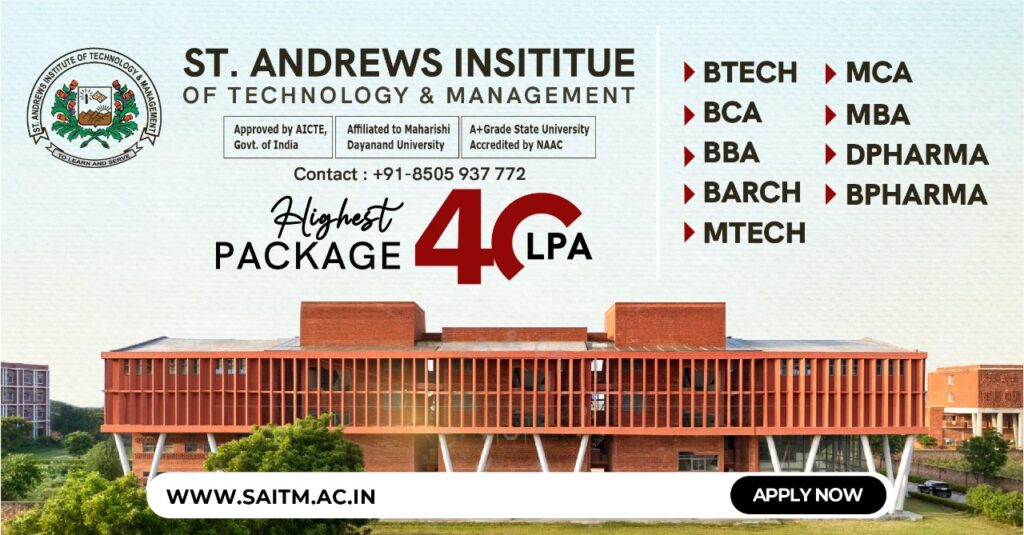
Here’s a general overview of the salary range for Bachelor of Computer Application graduates in India across various job roles:
Entry-Level Positions
- Software Developer/Engineer
- Salary Range: ₹3.0 lakh to ₹6.0 lakh per annum
- Description: Involved in application development, coding, testing, and maintenance of applications.
- Web Developer
- Salary Range: ₹2.5 lakh to ₹5.5 lakh per annum
- Description: Designs and develops websites, web applications, and user interfaces.
- Systems Analyst
- Salary Range: ₹3.0 lakh to ₹6.0 lakh per annum
- Description: Analyzes and designs information systems to meet organizational needs.
- Network Administrator
- Salary Range: ₹2.5 lakh to ₹5.5 lakh per annum
- Description: Manages and maintains an organization’s computer networks and communication systems.
- Database Administrator (DBA)
- Salary Range: ₹3.0 lakh to ₹6.0 lakh per annum
- Description: Manages and maintains databases to ensure data security, integrity, and availability.
Mid-Level Positions (with 3-5 years of experience)
- Senior Software Engineer
- Salary Range: ₹6.0 lakh to ₹12.0 lakh per annum
- Description: Leads development projects, designs software architectures, and mentors junior developers.
- Project Manager (IT)
- Salary Range: ₹8.0 lakh to ₹15.0 lakh per annum
- Description: Manages IT projects, coordinates teams, ensures project delivery within scope, time, and budget.
- IT Consultant
- Salary Range: ₹6.0 lakh to ₹12.0 lakh per annum
- Description: Provides advisory services on technology solutions, digital transformation strategies, and IT infrastructure.
Senior-Level Positions (with 5+ years of experience)
- IT Manager/Director
- Salary Range: ₹12.0 lakh to ₹25.0 lakh+ per annum
- Description: Oversees IT operations, strategic planning, budgeting, and implementation of IT initiatives.
- Chief Technology Officer (CTO)
- Salary Range: ₹20.0 lakh to ₹50.0 lakh+ per annum
- Description: Sets technology strategy, leads innovation, and ensures technology alignment with business goals.
FAQs
What is BCA?
BCA stands for Bachelor of Computer Applications. It is an undergraduate degree course in software applications, typically spanning three years and structured into six semesters of study. Is BCA a professional course? Yes, it focuses on imparting specialized knowledge and skills in the field of computer applications, preparing students for various professional roles in the technology sector.
Is BCA considered a professional course?
Yes, the Bachelor of Computer Applications (BCA) degree is recognized as a professional course aimed at preparing students for careers in software applications and information technology. It effectively combines practical skills with theoretical knowledge essential for the industry. This ensures that graduates are well-prepared for diverse roles in the field. Is BCA a professional course? Absolutely, and its curriculum is designed to meet the dynamic demands of the tech industry.
Can BCA graduates work abroad?
Yes, BCA graduates can work abroad. Many international companies recognize the BCA degree, and graduates can find opportunities in countries with a strong IT industry presence.
Can I join BCA without maths?
Yes, you can pursue BCA without having studied mathematics in high school, depending on the institution’s admission requirements. Many universities and colleges accept students from any stream, including arts and commerce. However, is BCA a professional course? Yes, it is, and while some institutions may not require a math background, others might prefer or require it. It’s crucial to check the specific admission requirements of the college or university you are interested in. Additionally, having a basic understanding of mathematical concepts can be beneficial, as the BCA syllabus includes subjects like data structures and algorithms.
Is math important in BCA?
Is BCA a professional course? Yes, and math plays a vital role in it. Subjects like data structures, algorithms, computer graphics, and networks in the BCA curriculum demand a solid grasp of mathematics. Although some colleges admit students without a math background, possessing fundamental mathematical knowledge can facilitate the learning process and enhance performance in technical aspects of the BCA program, boosting problem-solving and logical reasoning essential for programming and application development.


